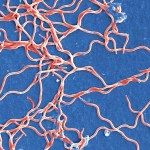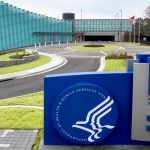CDC
Senate Republicans are again trying to ram through an Affordable Care Act replacement that threatens the health and well-being of millions of Americans. It’s shameful. But don’t take my word for it. Let’s look at what people who actually work in health care are saying about the Graham-Cassidy-Heller-Johnson bill.
In this interview, Sen. Bill Cassidy insists that his bill would protect people with pre-existing conditions. Blue Cross Blue Shield Association disagrees. (Cassidy also says in that same interview that his bill would work through the Children’s Health Insurance Program (CHIP), which…
The idea that the Affordable Care Act is a job killer is one of those regularly debunked talking points that won’t disappear. So, here’s yet more evidence that the ACA has had very little impact on the labor market.
In a new study from the National Bureau of Economic Research, a team of Stanford University economists found that even though different regions experienced varying labor market effects likely related to the ACA, the overall impact to jobs numbers was insignificant. In particular, researchers wrote: “Our findings indicate that the average labor supply effects of the ACA were close…
Poor Robert F. Kennedy, Jr. He went from admired environmental activist to reviled antivaccine campaigner so quickly. It began when he outed himself in 2005 with his infamous conspiracy mongering screed about thimerosal in Salon.com and Rolling Stone. Basically, RFK Jr. is a member of what we used to call the mercury militia, a branch of the antivaccine movement that believes, more than anything else, that it is the mercury-containing preservative thimerosal that used to be in several childhood vaccines until 2002 drove an "epidemic" of autism. He's still a member, too, having recently…
Public trust in science is a fickle creature. Surveys show a clear majority of Americans believe science has positively impacted society, and they’re more likely to trust scientists on issues like climate change and vaccines. On the other hand, surveys also find that factors like politics, religion, age and race can greatly impact the degree of that trust. It presents a delicate challenge for agencies that depend on trust in science to do their jobs.
“Trust in science is high, but it’s not unanimous and it’s not completely unquestioned — and nor necessarily should it be,” Joseph Hilgard, an…
U.S. investments in global health research have saved millions of lives and prevented immeasurable suffering. And by working to detect, treat and eventually eliminate infectious diseases worldwide, we’re protecting our own country too. That cliché about diseases knowing no borders is unfortunately very true. All that alone should be enough to remain committed to the cause.
But a couple weeks ago, a new report from the Global Health Technologies Coalition (GHTC) offered another persuasive reason: U.S. funding for global health research and development (R&D) is good for the American economy…
I have to start this post with a mea culpa, perhaps even a mea maxima culpa. I've been going on and on, in essence gloating about how the antivaccine movement was once again betrayed by Donald Trump. After the betrayal that was the appointment of the ultimate pro-vaccine pharma shill as FDA Commissioner, the second betrayal was the appointment of Dr. Brenda Fitzgerald as the new director of the Centers for Disease Control and Prevention. And, yes, on the surface, Dr. Fitzgerald doesn't appear to be that bad a pick for CDC director. She has a history of being very pro-vaccine during her…
As I mentioned yesterday, at NECSS I gave a talk, Whither the antivaccine movement in the Age of Trump? At the time, I only knew the identity of one of the most important public health figures appointed by President Donald Trump, and that's Scott Gottleib, the man appointed to be FDA Commissioner. As I noted when his name first came up as a candidate for this position, antivaxers weren't going to like it. Why? One reason is because Gottlieb is the ultimate pharma shill, if such a thing exists. Another reason is that he is very pro-vaccine. This amuses me when I consider the high hopes…
In pseudomedicine, fake diseases predominate. Basically, fake diseases are diseases that do not exist in conventional medicine as diagnostic entities because there does not exist sufficient sufficient evidence to support them as one or there exists compelling evidence that they are not. Naturopaths, for instance, like to diagnose people with "adrenal fatigue," which is one of the prototypical "fake diseases." Basically, it involves a constellation of vague symptoms that may include a combination of several of the following: fatigue, inability to handle stress, cravings for salty foods,…
Last year’s emergency Zika funding is about to run out and there’s no new money in the pipeline. It’s emblematic of the kind of short-term, reactive policymaking that public health officials have been warning us about for years. Now, as we head into summer, public health again faces a dangerous, highly complex threat along with an enormous funding gap.
“The Zika threat will get worse,” said Claude Jacob, chief public health officer at the Cambridge Public Health Department in Massachusetts and president of the National Association of County & City Health Officials (NACCHO). “And the…
When you ask public health advocates about President Trump’s recent budget proposal, you typically get a bewildered pause. Public health people don’t like to exaggerate — they follow the science, they stay calm, they face off against dangerous threats on a regular basis. Exaggerating doesn’t help contain diseases, it only makes it harder. So it’s concerning when you hear words like this about Trump’s budget: “devastating,” “not serious,” “ludicrous,” “unfathomable.”
Released in late May, Trump’s fiscal year 2018 federal budget proposal calls for cutting the budget at the Centers for Disease…
A Zika attack rate of just 1 percent across the six states most at risk for the mosquito-borne disease could result in $1.2 billion in medical costs and lost productivity, a new study finds. That’s more than the $1.1 billion in emergency Zika funding that Congress approved last year after months of delay and which is expected to run out this summer.
“One of the troubling things last year was that (Zika funding) was viewed as a cost — every week, there was another delay and more people becoming infected and more chances of birth defects,” study co-author Bruce Y. Lee, an associate professor at…
Public health is in trouble.
Last month, President Trump released his proposed budget for fiscal year 2018. It was more of an outline, really, and didn’t provide many details, but it did call for a nearly 18 percent cut to the U.S. Department of Health and Human Services and for block granting the budget at the Centers for Disease Control and Prevention. At the same time, the White House supports repealing the Affordable Care Act. That repeal would also eliminate the Prevention and Public Health Fund, which now accounts for about 12 percent of CDC’s budget and funds critical public…
Most news on the dangers of antibiotic-resistant infections focus on adults. But children are very much at risk too. In fact, a recent study found that U.S. children have experienced a 700 percent surge in infections caused by particular bacteria that’s both resistant to multiple antibiotics and responsible for growing numbers of serious bacterial infections in kids.
“These organisms are scary, they’re hard to treat and respond to few antibiotics…and it’s the type of antibiotic resistance that’s capable of spreading itself to adjacent bacteria even if those bacteria haven’t been exposed to…
Last night was a bit weird. I think too many days of only getting a few hours of sleep finally caught up to me, and I crashed by around 9:30 PM. So, contrary to usually happens, when I say this post will be briefer than usual, I actually mean it; I have even less time this morning than usual to pump out a quickie post. However, this is the perfect time to look at one thing that probably doesn't rate a full heapin' helpin' of not-so-Respectful Insolence but that I'd like to take note of anyway. It's a bit of fake news that's been making the rounds similar to the fake news a couple of weeks ago…
[Note: The proprietor of the website has responded by e-mail. See Comment #37.]
Now that the unreal has become real, I was just thinking how weird it is that I've never actually blogged about a phenomenon that directly contributed to the election of Donald Trump. I'm referring to the phenomenon known now as "fake news." Now, by "fake news," I do not mean sloppy reporting. I do not mean biased reporting. I do not even mean a type of article that many crank websites publish in which a real news story (often with other news stories) is used as jumping-off point for pseudoscience and conspiracy…
In a (very) few short hours, Donald Trump will take the oath of office and become the 45th President of the United States. I realize that I don't normally blog about politics, at least other than that related to medicine, but I make no bones about it. I'm dreading 12 Noon ET on January 20, 2017. There is more than enough reason for dread given the likely effect on medical science, at the very least. Also, Donald Trump is antivaccine. He's shown it through meetings with Andrew Wakefield and Robert F. Kennedy, Jr, the former of whom spoke a year ago on a "Conspira-Sea Cruise" and the latter of…
Because taking health insurance away from millions of Americans isn’t bad enough, President-elect Trump has reportedly asked an outspoken critic of vaccines — a man who supported the thoroughly debunked notion that vaccines are linked to autism — to lead a commission on vaccine safety.
That man is Robert Kennedy Jr., who in 2005 wrote a “expose” published in Salon and Rolling Stone arguing that thimerosal, a preservative in vaccines, is tied to autism. Salon retracted the article after critics “further eroded any faith we had in the story’s value.” Rolling Stone dumped the story too. More…
The Pump Handle is on a holiday break. The following, which was originally published on Jan. 29, is one of our favorite posts from 2016.
by Kim Krisberg
In the midst of another national debate over gun safety regulations, some argue that higher rates of gun ownership will protect people from dangerous strangers with deadly intentions. Physician and public health researcher Michael Siegel set out to study that argument. He ultimately found no relationship between gun ownership and stranger-related firearm homicides. But he did find that gun ownership levels translated into higher homicide…
As 2016 comes to a close — and 2017 looms with enormous uncertainty — let’s end the year with some encouraging public health news. This time it’s a study on one of the 10 great public health achievements of the 20th century: fluoridation.
Published this month in Health Affairs, the study is an update on a 2001 study that marked the most comprehensive examination to date of community water fluoridation benefits and costs. This new study found that in 2013, more than 211 million American residents had access to fluoridated drinking water. That fluoridation was associated with the prevention of…
CDC: U.S. life expectancy declines, death rates up for heart disease, diabetes, unintentional injury
For the first time in more than two decades, U.S. life expectancy has dropped.
This week, the Centers for Disease Control and Prevention reported that in 2015, U.S. life expectancy at birth was 78.8 years — that’s a decrease of 0.1 year from 78.9 years in 2014. Among males, life expectancy went from 76.5 years to 76.3 years; among females, it went from 81.3 years to 81.2 years. According to news reports on the findings, no one single factor caused the drop, but it’s still a cause for concern. Over at The New York Times, Katie Rogers reports:
Dr. Peter Muennig, a professor of health policy and…




